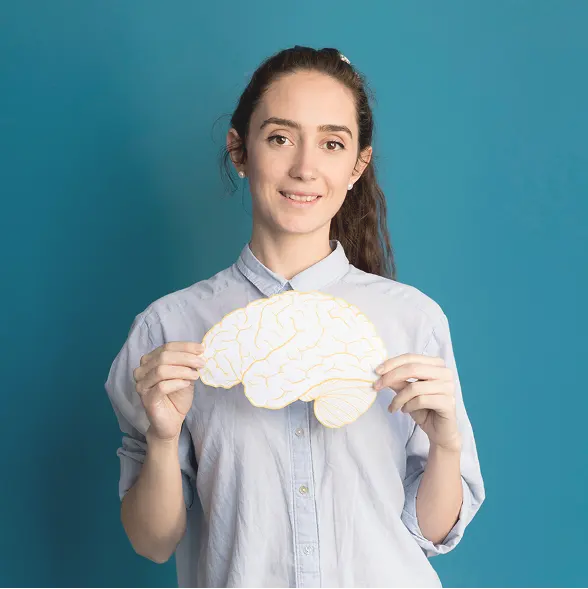TMS Therapy
TMS therapy is a non-invasive, outpatient treatment that uses magnetic fields to stimulate nerve cells that is FDA-approved to treat depression and OCD. TMS could provide the relief you deserve.
TMS Therapy: A Brief Overview
Transcranial Magnetic Stimulation (TMS) Therapy is an FDA-approved treatment designed to help individuals struggling with depression and OCD that have failed traditional oral medications.
This noninvasive brain stimulation therapy uses electromagnetic pulses to stimulate specific areas of the cortex thought to be underoptimized. At Psychiatry Treatment Centers, we offer TMS therapy as a safe and effective alternative for those who have not found relief through traditional antidepressant medications.
During TMS, a medical professional will place a magnetic coil near the patient’s head which sends an electromagnetic pulse into the brain to increase its activity. Unlike traditional forms of psychotherapy and medication, TMS does not require any sedation or anesthesia and can be done in an outpatient setting. It is generally well-tolerated and painless, with minimal side effects.
TMS is sometimes called repetitive transcranial magnetic stimulation (repetitive TMS or rTMS).


Is TMS Therapy Right For You?
TMS therapy can treat a wide range of psychiatric disorders and certain physical conditions, however it may not be suitable for everyone. It’s important to consult a psychiatric provider to see if TMS therapy is the appropriate treatment for you – we provide consultation appointments for that reason.
During a TMS consultation, our psychiatric provider will consider your age, medical history, and current mental health status to determine whether TMS therapy is a good fit for your needs.
Some things to know about TMS:
- TMS therapy is safe and non-invasive.
- It is FDA-approved for several mental health conditions.
- Most insurance providers cover TMS therapy.
- TMS has very few side effects and produces promising results for many.
- TMS treatment sessions are daily and typically last approximately 20 minutes over a 6 week period, followed by a 2-3 week taper period.
- If you have tried other treatments without success, TMS may provide the relief you’ve been searching for.
TMS therapy is a revolutionary mental health treatment option.
TMS Therapy: Depression Treatment Without Side Effects
TMS therapy, also known as Transcranial Magnetic Stimulation, uses magnetic pulses to activate brain regions linked to depression. It is a straightforward, non-invasive, outpatient procedure and we use the latest in TMS technology, Magstim Horizon 3.0 with Stimguide as well as the latest Brainsway device. TMS is FDA approved for treatment-resistant depression, obsessive-compulsive disorder (OCD), and smoking cessation and there’s no better place to undergo TMS treatment than PTC.
In addition, TMS is being used for many off-label treatment programs. Curious to see how TMS works? Please watch the following Magstim overview video. If you have any questions, please don’t hesitate to give us a call or fill out our contact form for more information.
TMS Therapy Common Conditions
Have you been wondering if TMS therapy can help you with your unique demands? Take a look at the following common mental health problems and examine how TMS treatment may assist in your well-being.
Depression
TMS therapy was approved by the FDA to treat depression in 2008. It is also used to treat adolescents and young adults with depression instead of long-term use of antidepressants. TMS is a powerful, non-invasive therapy that can aid people in overcoming severe depression.
Obsessive Compulsive Disorder (OCD)
Approximately one in five people are afflicted with OCD. Genetics have been implicated in its causation, although a communication breakdown between brain regions responsible for decision making and emotion control (particularly the frontal lobe) has also been implicated. TMS may help to cure the distressing symptoms of OCD.
Magstim
Magstim, a renowned provider of TMS solutions for mental health and a pioneer in neuroscience research, has declared that the FDA has approved the use of Horizon 3.0 (with or without StimGuide+) and E-z Cool Coil to treat adult patients suffering from Obsessive Compulsive Disorder (OCD) and Major Depressive Disorder (MDD). This clearance allows for a non-invasive treatment option for adult patients with OCD in conjunction with MDD.
BrainsWay
Deep transcranial magnetic stimulation (deep TMS), offered by BrainsWay, is a clinically proven, non-invasive outpatient procedure for treating various psychiatric conditions such as depression, obsessive-compulsive disorder, and smoking addiction. It is FDA-cleared with minimal side effects, short treatment time (20 minutes) and no lengthy recovery period, making it easy to fit into a patient’s daily routine. Discover if Deep TMS is a suitable option for your mental health.

Schedule Your Consultation Now
Whether you suffer from depression or another mental health condition, we provide various outpatient psychiatric services that may provide the relief you need. To explore your options, please schedule a consultation with us below.
Hear From Our Patients

TMS Therapy Increases Electromagnetic Brain Activity
The electromagnetic pulses used in TMS therapy are non-invasive and painless, passing through the scalp to stimulate nerves beneath the surface. The strength of these pulses can be adjusted to achieve the desired therapeutic effect.
TMS for depression primarily focuses on treating the brain's left dorsolateral prefrontal cortex (DLPFC), while TMS for OCD primarily focuses on treating the supplemental motor area (SMA). By stimulating these regions, TMS therapy helps the brain’s emotional regulation center function more effectively, providing relief for individuals struggling with depression (TRD) and OCD. At Psychiatry Treatment Centers, we offer FDA-approved TMS therapy as part of our advanced psychiatric services, giving patients a safe and effective option for mental health treatment.
This electromagnetic stimulation increases brain activity, resulting in improved cognitive functioning, increased energy levels, and improved mood. TMS therapy has very few side effects and is covered by most insurance providers, making it an affordable option for many.
Begin Your Mental Wellness Journey Today
01
Submit an Online Form or Contact Us at (833)4-PTCMED (833) 478-2633
02
Get Your Personalized Treatment Plan
03
Find the Inner Peace You’ve Been Seeking.
Ready to Get Started?
At Psychiatry Treatment Centers, we are dedicated to enhancing mental health at both an individual and community level. If you are in or near the greater Los Angeles area (California) or the greater Savannah area (Georgia), our trained professionals are here to support your journey toward well-being.
Non-Invasive Treatments
Typically Covered by Insurance Payers
Personalized Treatment Plans
Helping you Achieve Lasting Wellness
Get the mental health support you need – it’s time.
Schedule a Consultation!
Please contact us via our confidential HIPAA-compliant form below, and we will get back to you within 24-48 business hours.
TMS Therapy FAQs
Most people who have not yet discovered TMS therapy often ask the same questions. Please review our frequently asked questions or call us for more information: 833-4-PTCMED (833-478-2633)
How long is a TMS session and what can I expect? +
For the initial mapping and initial treatment, expect it to last approximately 45-60 minutes. For subsequent daily sessions, they typically are 20 minutes. The recommended course is five treatments a week for six weeks, often followed by a two to three week taper, totaling 36 treatments.
What are the side effects of TMS? +
TMS side effects are possible, however are generally minor and lessen with each treatment. Though rare, side effects can include a mild headache and fatigue which we have been able to minimize with our clinic’s specific protocols. Overall, a very small percentage of patients experience side effects at all.
Does insurance cover TMS therapy? +
Yes, TMS is covered by most insurances but it can vary by state. To see our full list of insurances, please click here.
Is TMS the same as electroconvulsive therapy (ECT)? +
No, TMS and ECT are two entirely different treatments, although both are used to treat depressive symptoms. TMS is a non-invasive treatment that involves electromagnetic pulses while ECT is an invasive treatment requiring anesthesia and involves passing small electric currents through the brain.
What can TMS help treat? +
TMS therapy is FDA-approved to help relieve symptoms of major depression, treatment-resistant depression, and obsessive-compulsive disorder. Contact us for a consultation to see if TMS is suitable for you.
Who shouldn't get TMS therapy? +
TMS may not be suitable for people with certain types of metal or electronic implants in or near the head. This includes deep brain stimulators, cochlear implants, aneurysm clips or coils, metal plates or screws, or bullet fragments. These devices can interact with the magnetic pulses used during TMS.